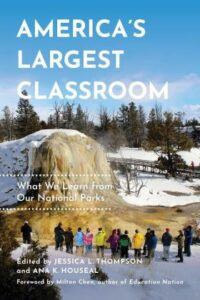
NMU Professor Thompson Co-edits National Parks Learning Book June 30, 2020
NMU public relations professor and alumna Jes Thompson co-edited the recently published America’s Largest Classroom: What We Learn From Our National Parks, which has been nominated for the National Nonfiction Book Award. Thompson recruited NMU art and design alumna Abigail Cook to create graphics and help with the final layout and photo rendering for the book’s publisher, University of California Press.
America’s Largest Classroom features 21 chapters from authors across the country. It is a collection of case studies about different types of place-based learning programs on topics such as indigenous knowledge, climate change, environmental justice, citizen science, and inclusivity at parks and public lands. The book offers insight and practical advice for improving educational outreach at national parks, as well as suggestions for classroom educators on how to meaningfully incorporate National Park Service sites into their curricula.
Thompson and co-editor Ana Houseal, associate professor and science outreach educator from the University of Wyoming, spent more than three years on the endeavor. Both served on the National Park Service Advisory Board-Education Committee from August 2011 to January 2017.
“We ‘launched’ the book at the Learning Revolution event, an online global conference with more than 160,000 registered participants,” Thompson said. “Dr. Milton Chen, author of EducationNation, chaired the event; he also wrote the foreword to the book. Former director of the National Park Service, Jon Jarvis, and current associate director for education and interpretation, Tom Medema, joined us to show NPS support for the book and agency perspective on park-based learning. More than 150 people attended our live Zoom session.”
A recording of the session is posted here. Thompson and Houseal also worked on a special issue of a peer-reviewed academic journal, Park Stewardship Forum. The special issue was published in late May and includes additional case studies and expansions on some of the content from the book. The journal is an open-source publication; all of the articles may be downloaded for free.
Daniel Beaupré,vice president of experiences in the education division of the National Geographic Society, wrote the following review: “America’s Largest Classroom is a masterfully crafted assembly of case studies reflecting the purposes, passions, and impacts of place-based education in our national parks. Written by the very best practitioners, this book offers rich and diverse illustrations of powerful and enduring educational experiences designed to open the eyes, ears, and hearts of the young people who will steward our planet.”
NMU professor Sarah Mittlefehldt, author of Tangled Roots: The Appalachian Trail and American Environmental Politics, praised her colleague’s project in a review. She said the national parks have held a special place in the American imagination for more than a century.
“They have helped us to appreciate our common past, and have allowed us to celebrate the inspiring landscapes of our country. America’s Largest Classroom offers a new way of thinking about the national parks as laboratories for learning. This impressive collection includes stories from places as diverse as the Great Smoky Mountains to Grand Teton National Park, and illustrates how these places can serve as teaching tools for topics that range from climate change to environmental justice, hydrology, and more. America’s Largest Classroom belongs on the shelf of all educators who value place-based learning, and is a must-read for anyone who loves America’s national parks.”
Thompson teaches courses in environmental and social responsibility, new media and public relations. She is also a trained facilitator and mediator and holds an interdisciplinary graduate certificate in Adaptive Management of Environmental Systems. Her research is focused on team and organizational communication about complex ecological issues, such as climate change resilience and sustainable development.

Comments (0)